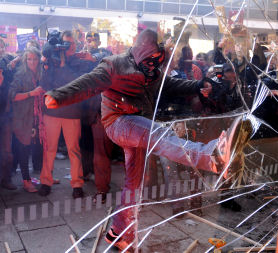Will politicians bow to protesters?
From Beijing to Millbank, it’s the question of the week. What makes a protest -whether by leaders criticising human rights abuses or student activists breaking windows- into a political gamechanger?

It’s not necessarily about scale: a million people marched against the Iraq war, but Tony Blair still invaded. It’s not about shock value: Margaret Thatcher rode out the IRA hunger strikes. It’s not even about prime ministerial stubbornness: Blair defied the Countryside March despite being personally ambivalent about hunting.
Success or failure depends on two factors: how much would unravel if ministers surrendered, and how far protestors are supported by a more passive majority. The poll tax was doomed once ministers realised the masses were nearly as angry about it as the minority charging police lines. But Blair held out on Iraq both because the stakes were high, and the public was split: he gambled on convincing them.
Just as his Chinese hosts were doubtless expecting the human rights question, David Cameron has foreseen opposition to the cuts spilling onto the streets. He may be shaken, but shouldn’t be surprised. So what are the students’ chance of success?
Public opinion has been narrowly against tuition fee rises, and like child benefit cuts, the issue hurts the Conservatives’ core vote: professionals (whose children are more likely to go to university) dislike raising fees more than CDEs.
But there’s little proof of a serious generational clash, uniting youth against their elders: a recent YouGov poll found less hostility to fee rises among 18 to 24-year-olds than among the middle-aged. Perhaps that’s because fewer than half of young people go to university: the rest, struggling in a tough job market, may lack sympathy for contemporaries observed on Freshers’ Week pub crawls. That gives ministers something to work with.
And while the coalition is uncomfortable on the issue, given Liberal Democrat opposition to fees, so in some ways is Labour: they originally introduced fees, and triggered this year’s review of them.
Defying public anger is always risky for politicians. But so is giving in. Surrender would not only mean unpicking a hard-won spending review, but critically would galvanise more revolts on everything from welfare reform to NHS reorganisation. Some of Vince Cable’s colleagues really need him to hold the line.
Gaby Hinsliff is the former Political Editor of the Observer
-
Latest news
-
Windrush scandal: returning to the UK after a forty year wait6m

-
Netanyahu ‘survival’ depends on ‘expanding war’ says head of Palestinian National Initiative5m

-
Proposed law change could strip parental rights from paedophiles5m

-
Hugh Grant settles privacy lawsuit against The Sun newspaper publisher2m

-
Post Office Scandal: what did top executive know?6m

-




